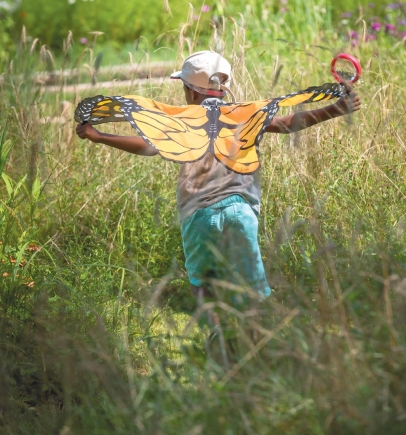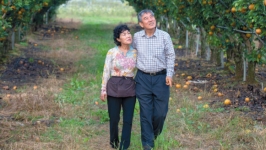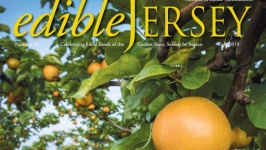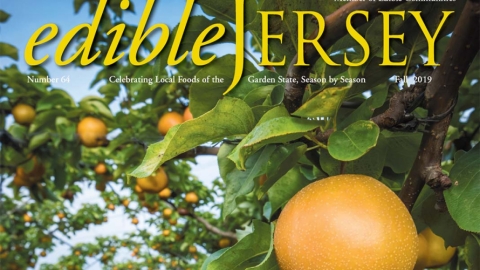WHERE FARM MEETS CITY: URBAN FARMING INITIATIVES
Editor’s Note: We are pleased to highlight three unique urban initiatives in this issue, as examples of the many collaborative,efforts statewide to effect change, one seed at a time.
MOBILE MINDS | GROW IT GREEN | DOWN BOTTOM FARMS
MOBILE MINDS
A sensory experience, combined with learning, becomes a powerful tool with a lifelong impact.
That’s the vision behind Mobile Minds of New Jersey, a nonprofit organization based in Hamilton that seeks to empower and educate students from high-risk populations through hands-on learning.
Founded in 2011, Mobile Minds is the vision of Daraka Saunders, whose roots run deep as a community activist and civic association organizer in Mercer County.
One of the first programs her civic association helped organize was a summer youth basketball clinic, which received an overwhelming response. The idea of an academic summer camp soon began to take shape.
“We felt it would be most beneficial to host a camp to combat summer ‘brain drain’ to help give kids an edge in school the upcoming year,” she says. “Not only did we want to help tutor children, we wanted to provide a comfortable learning environment rather than feeling the pressures of being at school.”
That year, they started a half-day, science-based program where kids of varying ages had to work together to complete hands-on projects. They were given supplies, parameters, and the freedom to see what they came up with on their own.
“They loved it,” says Saunders. “They loved the interactive aspect of working together, so we started to add more.”
Among their regular tutoring schedule, they had guests come in from Barnes & Noble and Utrecht Art Supplies to do projects.
“We found that if they weren’t doing a hands-on project the kids lost interest. So this became our main objective.”
Mobile Minds of New Jersey is in its ninth season. The group’s summer camp is now called S.E.A.L. Academy (Standard of Excellence in Academics and Leadership) and is offered for kids in kindergarten through eighth grade. The group is intentionally kept small, with a limited enrollment of 40 students, to maximize student engagement and individualized attention. Tutors are typically from the National Honor Society or volunteer interns from nearby colleges such as Princeton or Rider University.
Since its inception, the group has have moved from being in a community center to being located on an expansive church property surrounded by 10 acres—which is used constantly. In fact, part of the program requirements is that the kids get outside to play and explore, roaming the grassy land bereft of blacktop.
“When they start the day, they are encouraged to go outside as soon as they get here to decompress and get to know each other before starting their tutoring sessions,” says Saunders. “It’s so important for their minds to have a break from being in a classroom,” she says. To deepen the students’ sense of outdoor exploration, guests are invited, such as the state entomologist, who talks to them about bugs.
Everyone learns and works together, covering the same subjects but in different ways.
“The older kids might be studying the DNA of strawberries, while the younger kids might be studying their density. When the older kids finish what they are working on, they’ll often come over to see what the younger kids are doing and learn with them too,” she says. “What’s more, subjects are often taught at a higher grade level, but it doesn’t feel that way because the hands-on aspect adds an element of play.”
One of the newer highlights of the S.E.A.L. program is its partnership with The Barn at Gravity Hill in Titusville, co-owned by Maria Nicolo and David Earling. Here, the students get the chance to use vegetables they picked themselves to make lunch, and to share what they made with their peers.
“It becomes an encouraging environment to try new things,” says Nicolo. “They are more apt to try something new when given a variety of choices, and when all the choices are healthy, it’s a win-win.”
At the end of each week, students leave the farm with a grocery bag full of organic produce. “So when the kids get home and say ‘I really liked that kohlrabi we had today,’ the families will have some to try for themselves along with some recipes and nutrition information to go along with it.”
This is made possible through their collaboration with Rolling Harvest Food Rescue, a nonprofit in Bucks County, PA, that partners with local farms to help bring healthy produce to food-insecure communities. Nutrition educators work with program participants to show them how to prepare the produce to make snacks and meals their whole family can enjoy. —Lauren Johnson
MOBILE MINDS
609.557.7325
mobilemindsnj.org
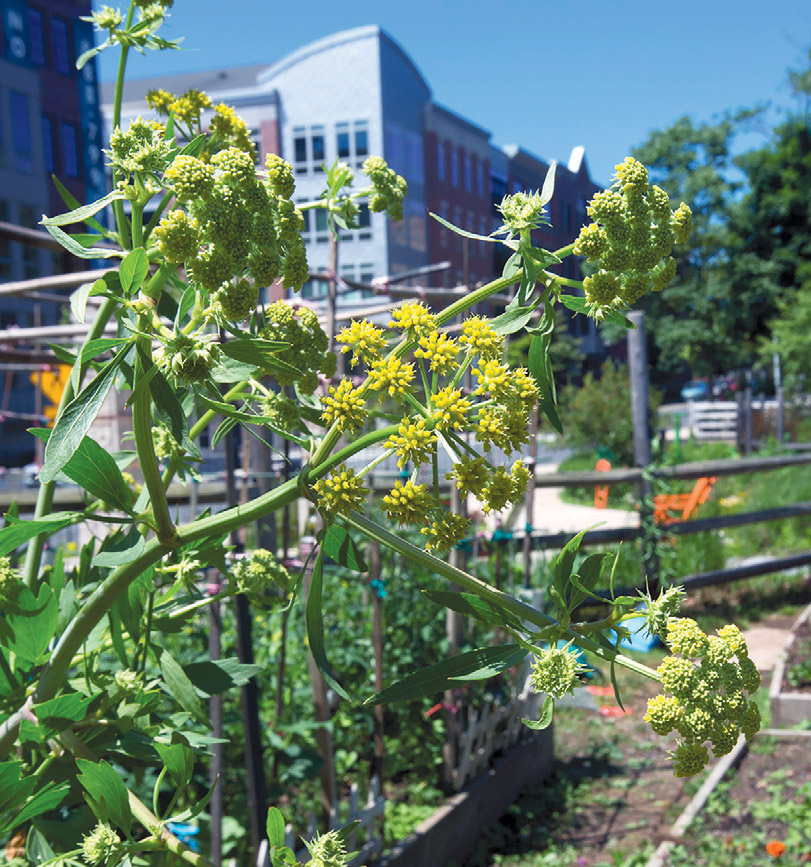
PHOTOGRAPH: JANE THERESE
GROW IT GREEN
At the foot of a development of luxury townhouses going up in downtown Morristown as part of a $1 billion upscale facelift is a thriving countermovement determined to preserve the area’s small-town charm.
The first signs are the totem poles, designed by local artist Gabriele Hiltl-Cohen. Their symbols represent the many communities living alongside each other here: Among them is a Sankofa bird honoring the area’s black community, a shell to represent islanders, a dragonfly for Asian immigrants, and numerous depictions recognizing the town’s Mexican, Central American, and South American residents.
The carrot-shaped bike rack next to the poles may be a symbol of its own, marking how food is pulling this North Jersey town together.
That’s all thanks to the efforts of three local women—Myra Bowie McCready, Carolle Huber, and Samantha Rothman—who, in 2009, got a lucky break. They wanted to start a community garden as a way to fight the rapid development of their town and its environmental impact. They eyed an empty lot being used as a junkyard and persuaded the private developer who owned it to let them build a makeshift garden—just for the time being, until the recession passed and he could build on the land.
Fast forward a decade, and the town now owns the land. The trio, who jokingly called themselves “three ladies and a garden hose” at the onset, have formed a nonprofit called Grow It Green. As Executive Director Erica Colace says, “Once the roots took hold, it was hard to go back.”
The garden has now expanded to 92 plots, adding a parklet with those totem poles and space for summer concerts, a walking path frequently used by residents of an adjacent senior home, and a picnic area that doubles as a classroom to teach residents about urban farming. An offsite farm on an acre lot at a local elementary school supplies produce to low-income residents, local food pantries, and CSA members. That location also hosts a regular farm stand, gardening lessons for the district’s second graders, and an evening series for adults.
“Very quickly, the whole thing snowballed from this idea of opening up a community garden to ‘We’ll put a farm in, too, and grow produce for the community.’ We had all these pie-in-sky ideas,” says co-founder Samantha Rothman. “Food is a vehicle in so many different ways to build community.”
Many of those ideas have come to fruition. Today, it would be difficult to live in Morristown and not have some interaction with the Grow It Green community. And yet, Colace and her team say the organization still isn’t reaching all segments of Morristown’s community. They worry about residents of what is known as Census Tract 435, home to the town’s poorest residents, many of whom work multiple jobs and can’t make the time to come to the urban farm and buy vegetables.
“We realized that we had these produce and programs, but we weren’t really reaching people who didn’t have the means to come to us,” Colace says.
Last summer, Grow It Green experimented with a pop-up farmers’ market that rotated among high-foot-traffic areas of town close to that census tract. They sold their locally grown produce, farmed using organic methods (official organic certification is out of reach for the small-scale farm, but Colace says they follow the guidelines to a T), at cost to whoever walked by. With eggplant for $1.25 per pound and lettuce at $1.50 per head, the market rivals the area’s organic grocery stores and bodegas alike. Shoppers using government SNAP benefits get an even deeper discount with a two-for-one deal.
“We always wanted to serve the have-nots,” says Carolle Huber, another co-founder. That’s because the group sees itself as a community- based nonprofit first, and a farm second. “A big part of this is, when you’re in a community garden, you’re gardening next to somebody who doesn’t look like you, and now you have a common thing,” Huber adds. “You are sharing stories and sharing food.”
The group isn’t ready to expand beyond Morristown just yet, but it has offered tours and guidance to groups from other Jersey towns who have expressed an interest in replicating parts of the Grow It Green model.
“This is a very good example of a high-functioning public-private partnership,” says Rothman, noting that the farm sits on public school land that was not being used at all before that. “Schools are tremendous landowners in this state. We turned something that there was no use for into something that is environmentally productive.” —Ambreen Ali
GROW IT GREEN
14 Maple Ave. Suite 300, Morristown
973.206.4177
growitgreenmorristown.org
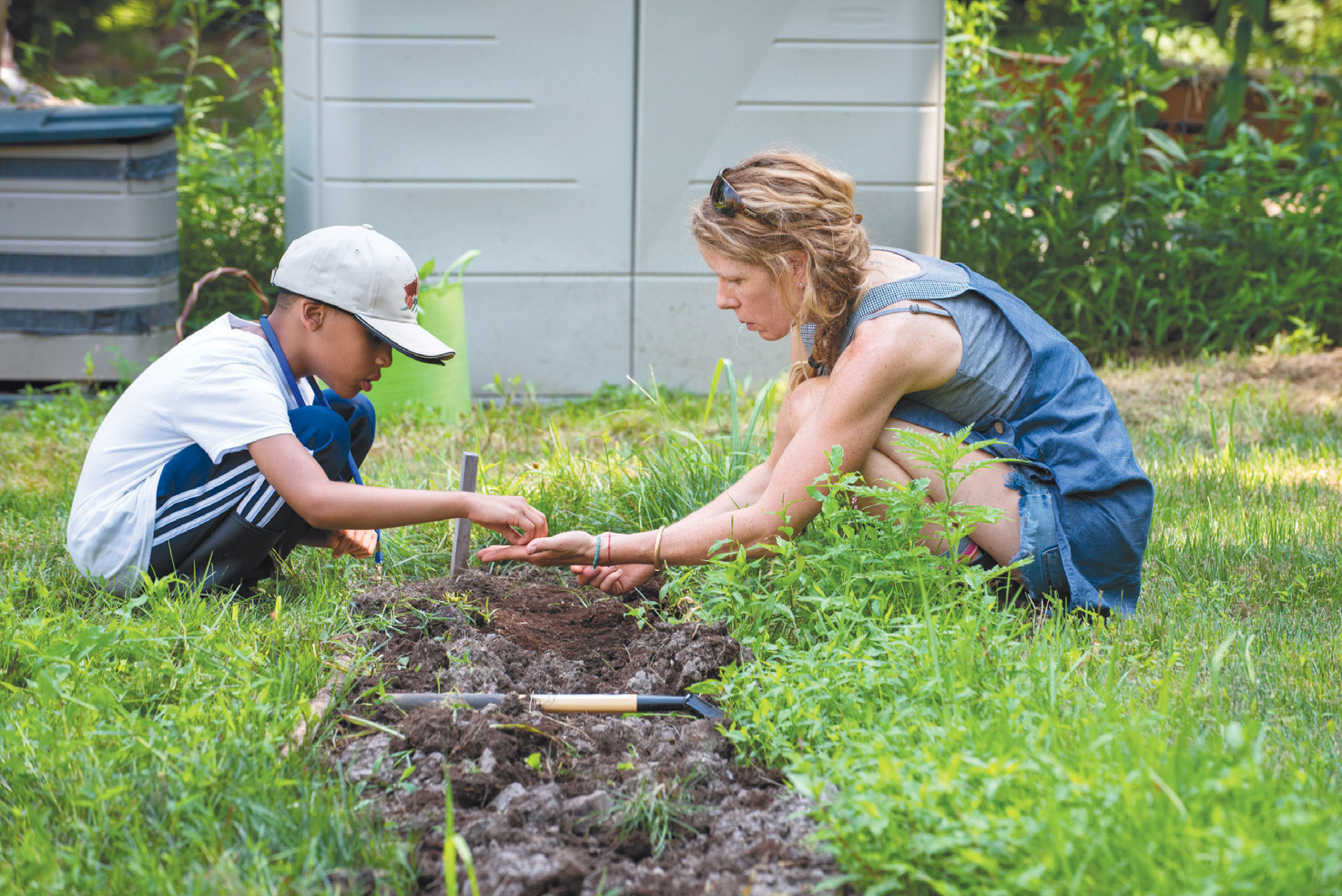 Farm manager Lori Watt and student Jayvien Page of Mobile Minds of NJ plant seeds at Gravity Hill Farm
Farm manager Lori Watt and student Jayvien Page of Mobile Minds of NJ plant seeds at Gravity Hill Farm
DOWN BOTTOM FARMS
In the heart of Newark’s cityscape, amid scenes of asphalt and industry, lies a half-acre brimming with vegetables, hoop houses and a fruit orchard. A local youth community sees to its success. Down Bottom Farms, part of the Ironbound Community Corporation’s Urban Agriculture Program, teaches students the value of farming in more ways than one.
“Even though we’re urban farming, our primary goal is liberating the land, which has been stolen from us and polluted by industry,” says Emily Turonis, farmer and youth organizer of Down Bottom Farms in Newark. “People in Newark don’t have access to plants, bugs, natural processes, or growing food,” she says. “So we’re providing a community space where people can do that. Community benefits everybody. When you have a sense of ownership of the land, you make it better and feel good doing so.”
Amid the urban landscape, the farm is proof that positive transformation can come by being proactive.
“People want to farm, eat fresh peaches, plant cilantro, and have beautiful spaces with ecological function in our neighborhood. Just because it’s been polluted for a long time doesn’t mean that we can’t change and celebrate it.”
Programs at the farm include daily school visits from Newark middle- and high-school students as well as after-school programs where kids learn about chickens, planting and harvesting fruits and vegetables, and more.
“Kids are looking for activities—they are dying to be part of something, and they share that enthusiasm with their school, their peers, and beyond,” Turonis says. “Not only are they learning, they are engaging with their community, having fun, running around, squirting each other with the hose, and loving it. It’s a place where they can be themselves.”
Every Saturday at 10am, volunteers of any age are invited to come work on the farm—receiving a big bag of vegetables in return. Many students return, some coming back from when the farm first began seven years ago.
“Our motto is: We are environmental justice leaders. What do we want? Clean air, clean water, healthy food. No more racism, no more sexism,” she says. “These are the issues we’re dealing with, and farming in an open, accepting community is a really beautiful way to be part of the solution.” —L.J.
DOWN BOTTOM FARMS
377-385 Ferry St., Newark
ironboundcc.org/down-bottom-farms
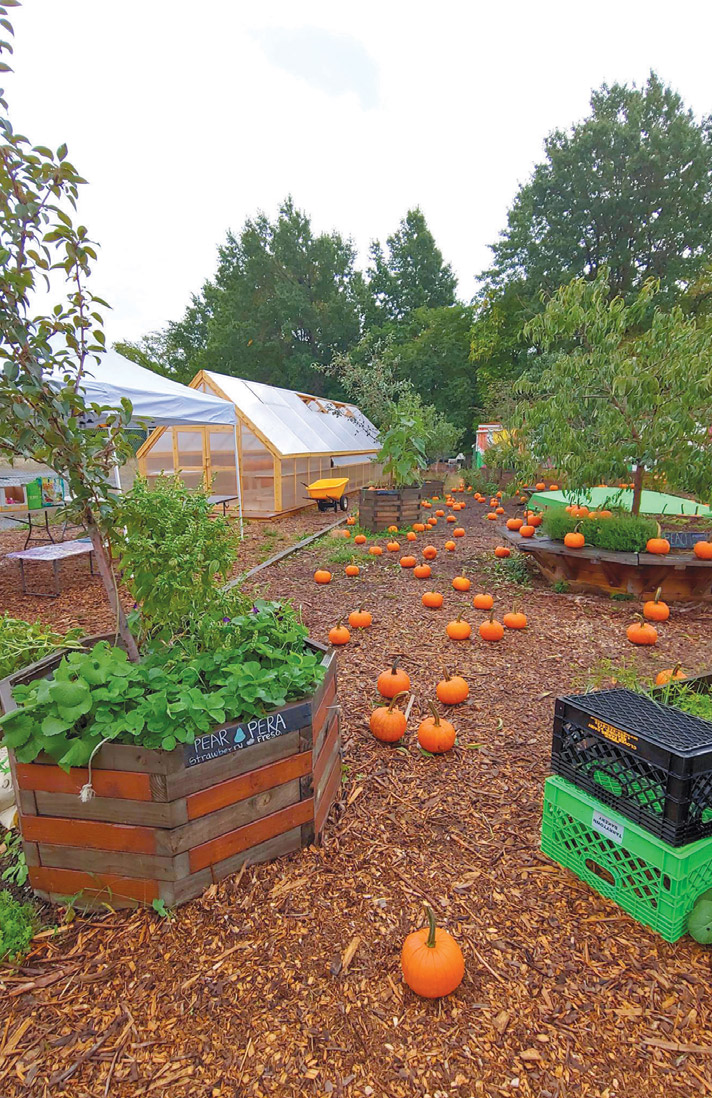
above: Down Bottom Farms; below: Students of Mobile Minds of NJ
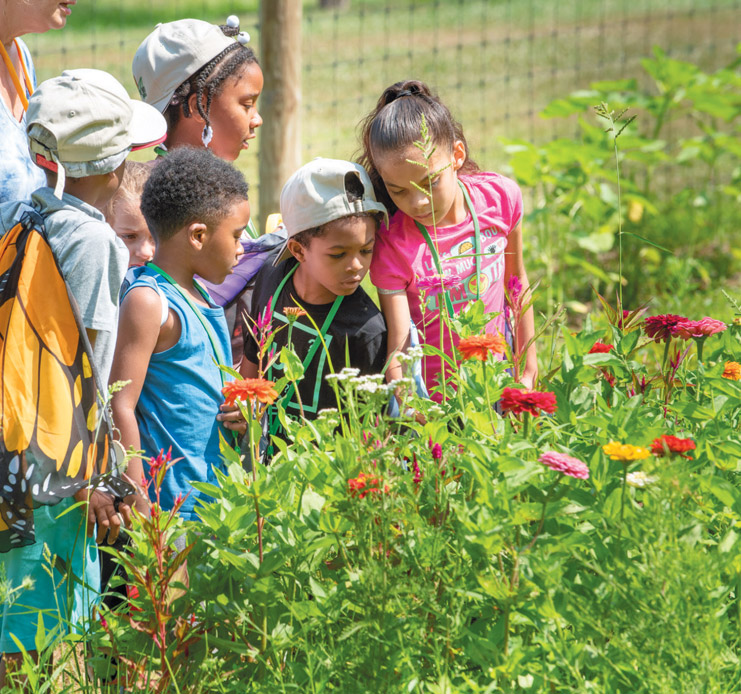
GET INVOLVED
More urban farming programs to get you growing:
CENTER FOR ENVIRONMENTAL TRANSFORMATION
1729 Ferry Ave., Camden
856.365.8111
cfet.org
CITY GREEN
171 Grove St., Clifton
973.869.4086
citygreenonline.org
GREATER NEWARK CONSERVANCY
32 Prince St., Newark
973.642.4646
citybloom.org
ISLES URBAN AGRICULTURE PROGRAM
10 Wood St., Trenton
609.341.4700
isles.org/services/urban-agriculture


